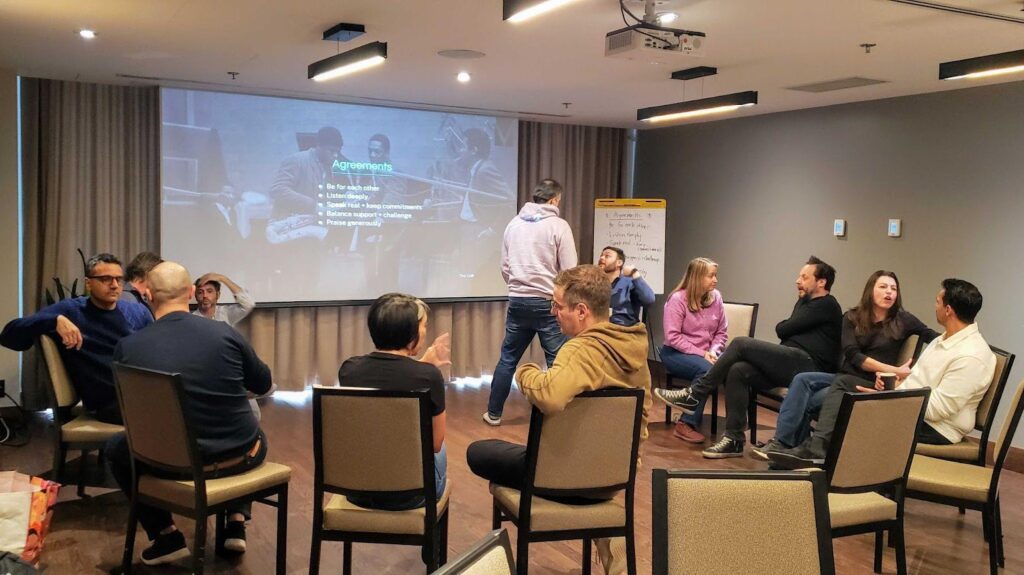In January, Phil G. Joseph, a young Black changemaker, launched Rep Matters in collaboration with Real Ventures. A passion project of Phil’s, Rep Matters is a video interview series which focuses on the key issues and experiences of Black tech leaders in the Canadian startup community.
This collaboration started soon after Phil was first introduced to John Stokes, a Partner at Real Ventures through their conscious leadership coach in April 2020.
“When I was first connected with Phil, I quickly understood that he was both sharp and passionate about making a mark in tech and VC. We discussed the lack of Black entrepreneurs in the Canadian startup scene and how much this situation could benefit from someone creating a platform for more Black voices to be heard and more Black role models to be visible.”- John Stokes
Following this initial exchange of ideas, Phil, with the support of John and the Real Ventures team, worked tirelessly over the last eight months to create and launch Rep Matters.
Increasing Black representation and participation in tech and Canadian venture capital
Ultimately, the series aims to serve as a catalyst to increase Black participation and representation by showcasing great Black leaders in the industry. We hope to demonstrate to investors that the entire startup ecosystem benefits from greater creativity and innovation when Black people are represented.
The exemplary leaders in this Series include:
- Janelle Hinds, Founder and Executive Director of Helping Hands,
- Frantz Saintellemy, President and COO of LeddarTech,
- Andre Charoo, Founder and Managing Partner at Maple VC,
- Pelra Azondekon, Director of Development and Strategic Enterprise at Québecor,
- Isaac Olowolafe Jr., Founder and Managing Partner at Dream Maker Ventures,
- Brent Ho-Young, Founder and CEO of Dream Payments, and
- Jimoh Ovbiagele, Co-Founder and CTO of ROSS Intelligence.
Each of their unique stories and life paths reinforce the importance of working together to build a tech startup community that is more diverse and inclusive.
To celebrate the series, we sat down virtually with Phil after its launch to chat about his hopes for the project, the traction and feedback it’s received to date, and where he sees it going from here.
How does it feel to share the Rep Matters series with the Canadian tech startup community?
To be honest, it was such a relief to finally put it out. I have been working on it for so long, trying to make everything perfect, but I finally gave myself a hard deadline, stuck to it and executed. So the immediate feeling was relief, and also gratitude for the people who helped me create it — like Real Ventures and my video director Ben Jackson. I would be lying if I didn’t share that my enthusiasm wasn’t also sprinkled with a bit (actually a lot) of fear of failure, but also massive excitement about the potential impact this project can have for the Black community and tech ecosystem.
Since launching the series, what kind of feedback have you received?
After a month, the feedback has been overwhelmingly positive. Given that each episode is a dialogue between two Black people, we purposefully explored topics that non-Black people wouldn’t typically have an opportunity to hear our perspectives on. Several non-Black people have told me they find tremendous value in each episode. It’s also very exciting for Black people to see themselves represented in conversations about tech and venture capital, so there is a lot of enthusiasm and that makes me proud.
How did you feel when interviewing tech leaders who looked like you?
It was empowering. It made me feel represented and welcome in this space. I got to see that there were other Black leaders in tech and VC, I just had to search harder to find them. As an extension of the interviews, it has been great to build relationships with trailblazers who understand how to leverage their lived experience as Black leaders in order to better help all of us succeed. Some have become mentors to me, and all of them have inspired me to make sure the message of Rep Matters is shared and that we take actions to invite more Black people to participate in tech and VC.
Was there anything mentioned by one of your guests during their interview that surprised you?
I was pretty shocked when Janelle Hinds told me she had created one of the first period trackers on the Android app store, but that the idea was always dismissed when she brought it up to other people in the tech space — and since then we have seen Apple and loads of independent apps add this utility to their health apps. That really got me thinking: what other possibilities for innovation are we missing out on simply because these solutions are misunderstood or simply not relevant to the traditional gatekeepers of innovation, who are predominantly male and white?
Was it a challenge to find Black tech leaders willing to participate in the project?
Overall I wouldn’t call it a challenge, but it did require time and intention to find the right people. Like with any project that seeks to represent diversity, we knew it would take more time and effort, we had to put into action the exact elements we recommend to others in order to move the needle.
What required the most effort was finding Black women, for two reasons.
1 — they are truly underrepresented, or underestimated as Janelle would say
2 — since there are so few, they are overtaxed for projects like this which are peripheral to their own work, and as such, they can’t always say yes, despite how interesting the project is.
That’s very interesting. We came across an article that stated that in a 2018 government led gender diversity initiative, only two of the three hundred plus women led businesses who succeeded in securing funding were led by Black women founders. What are your thoughts on this?
Examples like this reinforce my belief that Black people are rarely the beneficiaries of blanket diversity initiatives. Building our modern societies without dismantling the underlying historical racial hierarchy causes the perpetuation of racism and racial inequities at a systemic and often subconscious level. When we choose not to gather race based data, we become unable to measure racial disparities in various contexts. And so it isn’t surprising to me that even something as positive as a gender diversity initiative could perpetuate racial inequities, if the intersection of race and gender wasn’t taken into consideration.
This is why race based data collection, and a commitment to ending systemic racism are so important in tech and VC right now. In order to create diversity initiatives that create long-term measurable change for the Black community, we need to know what the starting point is. While the US still has massive racial diversity problems in this space, at least they have a data baseline to improve upon. In Canada, we don’t even know what that baseline is. There are no studies or reports on how much VC funding goes to Black founders, or how many Black VCs there are. This prevents us from measuring any improvement.
What was one of the biggest challenges you experienced throughout the creation of the series?
My fear of failure disguised as a desire for perfection. It was good that I had high standards at every part of the process, but during the editing, I’d find myself freezing for days at a time, unable to put the story together out of fear of doing the wrong thing. Ultimately, I had to learn to trust my creative process and realize that I was ok with people being critical of me personally, as long as the core messaging of Rep Matters got out and made an impact.
What are some of the outcomes you hope this project will bring about?
First and foremost, increased Black participation in tech and venture capital — that is the mission. I’d like to see Black youth being inspired by the guests on Rep Matters, and acquiring the knowledge and skills required for them to innovate and generate intergenerational wealth. I’d also like those who I call the “gatekeepers” in tech and VC to really see the opportunity here — creating a more equitable and inclusive space for Black people to join means increased opportunity for innovation, and a serious opportunity to decrease the racial wealth gap.
What are some steps you think VCs should take to increase the number of Black founders in their portfolios?
My first piece of advice is to watch all the Rep Matters episodes to learn more about what the problems are. Then I think VCs should hire Black Diversity, Equity & Inclusion (DEI) professionals to create tailored action plans to address this. Here are some starting points:
- Take ownership of the racial diversity problem in VC. From a conscious leadership perspective, taking full responsibility for a failure is key to creating a solution.
- Make diversity one of your core values, which should be reflected in all decision making processes. This should include recording racial diversity metrics within your team and portfolio, and setting tangible goals that are assessed regularly.
- Hire and/or promote Black VCs who have different networks and perspectives.
- Personally mentor/sponsor Black founders, even if they aren’t in your portfolio — introduce them to potential investors, clients, mentors, peers etc.
- Make collecting and sharing racial diversity data a priority. This is key to evaluating where we are as an ecosystem, and developing long-term action plans.
What advice would you share with Black founders looking to secure VC funding?
Again, my advice would be to learn directly from the Black founders and investors spotlighted in the Rep Matters episodes, about what it takes to secure funding. Secondly, I would encourage you to circle back and be radically honest with yourself about why you want VC funding, and evaluate if it is the right fit for your business model. And lastly, network and create authentic relationships with VCs that go beyond just your business idea.
**********
Watch the Rep Matters video series here and follow Rep Matters on LinkedIn, Twitter, Facebook, and Instagram for the latest updates!




